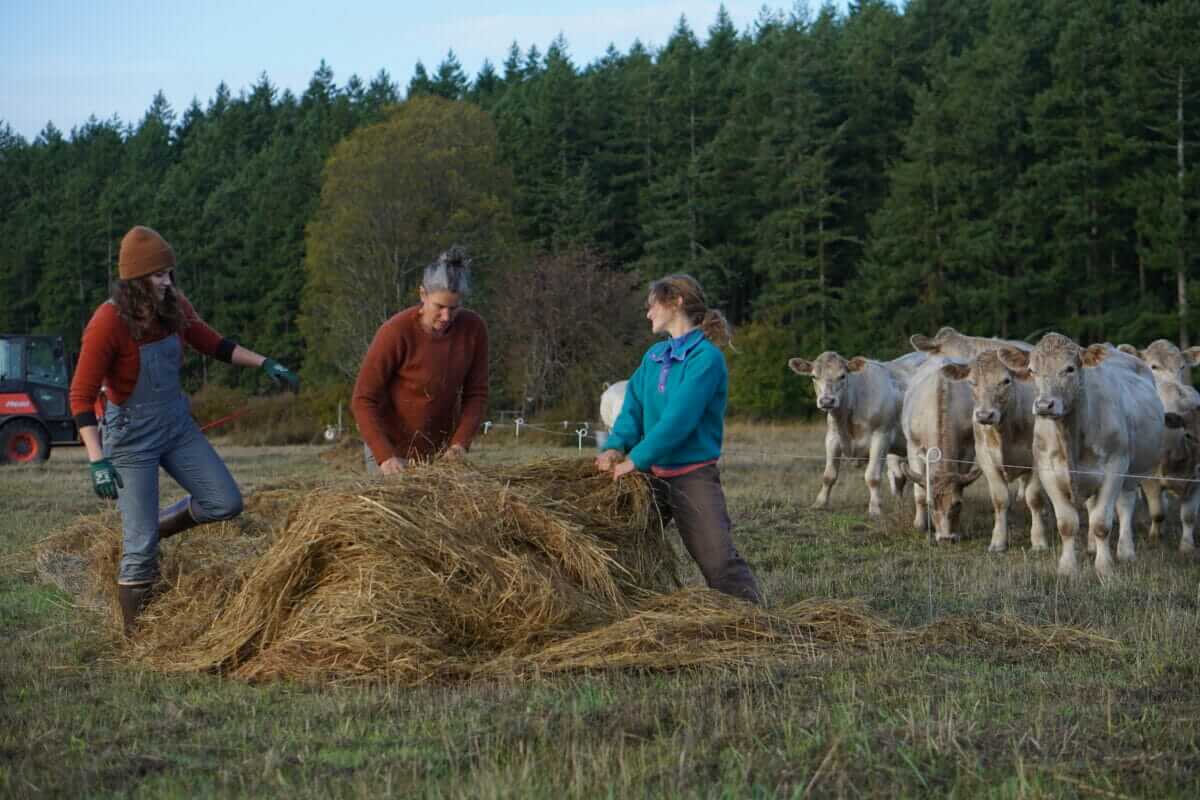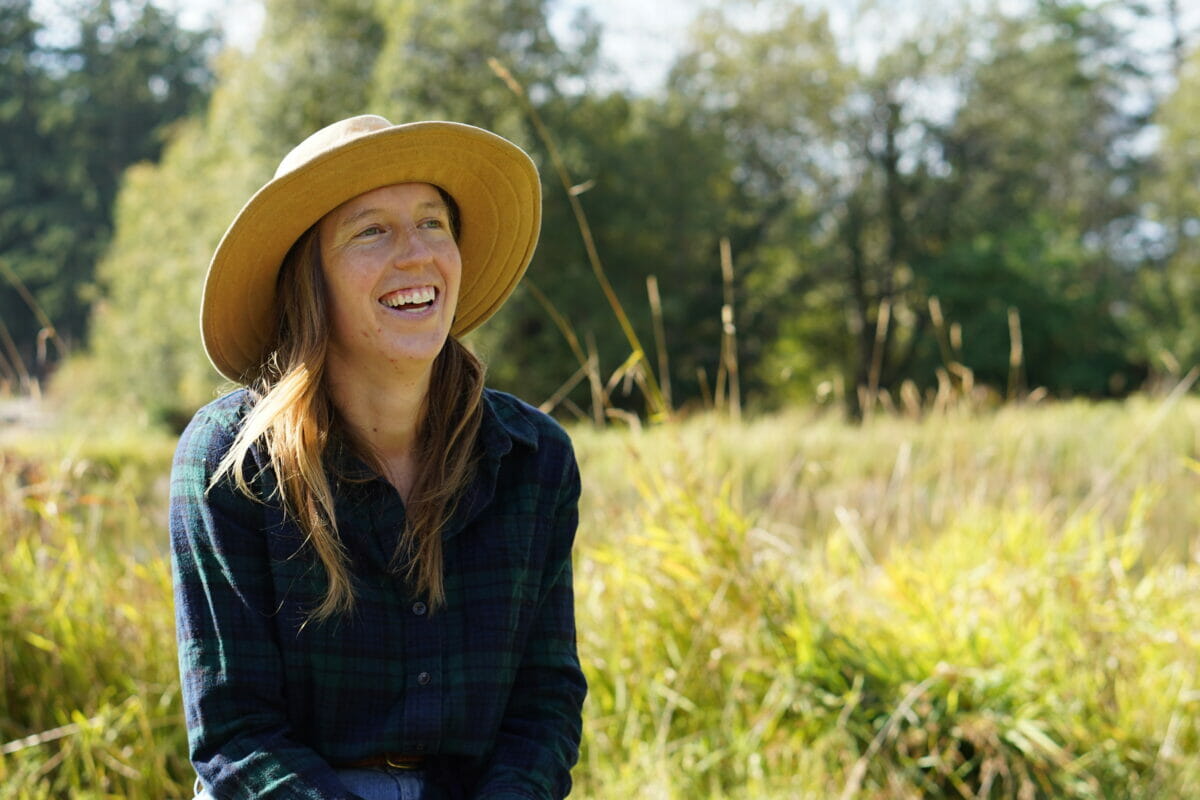Back to School: Teaching Others to Take Back the Land
This climate farm school is showing people what it takes to be an environmentally friendly farmer.
Back to School: Teaching Others to Take Back the Land
This climate farm school is showing people what it takes to be an environmentally friendly farmer.

Students follow a curriculum focused on sustainable agriculture.courtesy of Climate Farm School.
What’s the most important thing about being a farmer? Is it your schedule, your soil health or your crop rotation? For Laney Siegner, it’s your goals—the why that gets you back out on the field every day. Why are you doing what you’re doing? What is it all for?
That’s why one of the first things Siegner teaches her students at the Terra.do Climate Farm School is how to write up an action plan. It lays out their goals for the program, what they want to achieve and how they plan to do it, while also distilling the why. “Those action plans have been fascinating to read,” says Siegner, who’s able to tailor her lessons back to the motivation of her students depending on what they wish to achieve. “They have looked like everything from growing a home garden or [to] start growing three to five of my own vegetables a year or, in one person’s case…leading conservation work on farms across the country.”
The Climate Farm School has only been accepting students since last fall, but Siegner had been planning her own climate farm for years. She first got the idea for the farm while studying sustainable environments in graduate school at the University of California, Berkeley. During her research, she worked with local farms to see how they grew food productively while adapting to and mitigating the effects of climate change. Now, Siegner is offering that opportunity to others. Students can apply for one of 10 spots in the four-week program, and they get a chance to work with a partner farm.
While the students all get their hands dirty, this school isn’t a traditional agriculture program. For one, it’s designed for anyone from farm hands to complete novices, and past students have included entrepreneurs, tech innovators and community organizers. And as it’s only a month long, the curriculum is hyper focused on sustainable agriculture.
The students spend the first two weeks in an online class, learning about the theory and foundations of regenerative agriculture. The third week is spent on a partner farm, putting what they’ve learned into practice. In the final week, Siegner and the students return to their action plans, figuring out how they can implement personal, professional or community-level goals that focus on regenerative agriculture.
There are three host farms currently—in Washington State, California and Italy—and Siegner is looking to grow even further, speaking with other interested farms and hosts willing to take on participants. “There are all these farms in India that are like ‘we want to host this, when can we do it?’ So I’m trying to create a scalable model that works across countries and farms, and I’m arriving at that over time,” Siegner says.
The current model is still out of reach for some, and Siegner recognizes that. Not everyone is able to commit to a week of working on the farm in person, and the approximately $2,200 fee for the course isn’t in the budget for many aspiring farmers. As the school grows, Siegner wants to make it more accessible and affordable for people, and she says she’s experimenting with scholarships and sliding-scale fees. Opening up this opportunity also means that Siegner has a chance to share the magic that comes from stepping foot on a farm for the first time with an even wider audience.
“It’s incredibly rewarding,” Siegner says. “It’s really satisfying to me to see people that have not been any time on a farm kind of overcome some of their apprehensions. ‘Can I do this? Can I be in this space?’”

Siegner is also happy to bust the misconception that farming—and all that comes with it—is easy. “This is one of the hardest things to understand. The soil science and the different cropping patterns and the ecology and natural history of these different plants…I’ve been really impressed by that,” Siegner says. “My role is to kind of plug into all of that as an educator and an ally to farmers.”
The role of the school isn’t just to teach students to start their own garden but to do it in regenerative ways. Both the Climate Farm School and Terra.do are committed to advocating for climate action, which goes far beyond one person learning to grow tomatoes. For some students, the realization of how big the problem of climate change actually is can be demoralizing. But, Siegner says, students often bounce back with even more resolve. Attending the school “is a way of dealing with this kind of climate anxiety and grief that overhangs this crisis, because of the lack of global action and leadership.”
Of course, Siegner and her students know that individual action on climate change will go only so far, but they also see the cumulative benefits of each action. It’s that community spirit, or perhaps just a realization that our actions impact each other, that has propelled the farm school thus far. That enthusiasm is what makes Siegner want to expand further and bring more students into the fold. Her dream participant is someone who is interested in or has acquired a piece of land, and they are ready to do something with it. It’s someone who has not only thought about their goals, their why, but is ready to take the first step.
“There is this interesting moment right now where people are wanting to move to the country or wanting to buy land,” says Siegner, who welcomes those people with open arms. “Yes, you are in the right place. We’ll talk about this, we’ll show you some examples. We’ll give you resources. We’ll do everything we can as a community to enable this next step for you.”
Follow us
This work is licensed under a Creative Commons Attribution-NoDerivatives 4.0 International License.
Want to republish a Modern Farmer story?
We are happy for Modern Farmer stories to be shared, and encourage you to republish our articles for your audience. When doing so, we ask that you follow these guidelines:
Please credit us and our writers
For the author byline, please use “Author Name, Modern Farmer.” At the top of our stories, if on the web, please include this text and link: “This story was originally published by Modern Farmer.”
Please make sure to include a link back to either our home page or the article URL.
At the bottom of the story, please include the following text:
“Modern Farmer is a nonprofit initiative dedicated to raising awareness and catalyzing action at the intersection of food, agriculture, and society. Read more at <link>Modern Farmer</link>.”
Use our widget
We’d like to be able to track our stories, so we ask that if you republish our content, you do so using our widget (located on the left hand side of the article). The HTML code has a built-in tracker that tells us the data and domain where the story was published, as well as view counts.
Check the image requirements
It’s your responsibility to confirm you're licensed to republish images in our articles. Some images, such as those from commercial providers, don't allow their images to be republished without permission or payment. Copyright terms are generally listed in the image caption and attribution. You are welcome to omit our images or substitute with your own. Charts and interactive graphics follow the same rules.
Don’t change too much. Or, ask us first.
Articles must be republished in their entirety. It’s okay to change references to time (“today” to “yesterday”) or location (“Iowa City, IA” to “here”). But please keep everything else the same.
If you feel strongly that a more material edit needs to be made, get in touch with us at [email protected]. We’re happy to discuss it with the original author, but we must have prior approval for changes before publication.
Special cases
Extracts. You may run the first few lines or paragraphs of the article and then say: “Read the full article at Modern Farmer” with a link back to the original article.
Quotes. You may quote authors provided you include a link back to the article URL.
Translations. These require writer approval. To inquire about translation of a Modern Farmer article, contact us at [email protected]
Signed consent / copyright release forms. These are not required, provided you are following these guidelines.
Print. Articles can be republished in print under these same rules, with the exception that you do not need to include the links.
Tag us
When sharing the story on social media, please tag us using the following: - Twitter (@ModFarm) - Facebook (@ModernFarmerMedia) - Instagram (@modfarm)
Use our content respectfully
Modern Farmer is a nonprofit and as such we share our content for free and in good faith in order to reach new audiences. Respectfully,
No selling ads against our stories. It’s okay to put our stories on pages with ads.
Don’t republish our material wholesale, or automatically; you need to select stories to be republished individually.
You have no rights to sell, license, syndicate, or otherwise represent yourself as the authorized owner of our material to any third parties. This means that you cannot actively publish or submit our work for syndication to third party platforms or apps like Apple News or Google News. We understand that publishers cannot fully control when certain third parties automatically summarize or crawl content from publishers’ own sites.
Keep in touch
We want to hear from you if you love Modern Farmer content, have a collaboration idea, or anything else to share. As a nonprofit outlet, we work in service of our community and are always open to comments, feedback, and ideas. Contact us at [email protected].by Emily Baron Cadloff, Modern Farmer
January 30, 2022
Modern Farmer Weekly
Solutions Hub
Innovations, ideas and inspiration. Actionable solutions for a resilient food system.
ExploreExplore other topics
Share With Us
We want to hear from Modern Farmer readers who have thoughtful commentary, actionable solutions, or helpful ideas to share.
SubmitNecessary cookies are absolutely essential for the website to function properly. This category only includes cookies that ensures basic functionalities and security features of the website. These cookies do not store any personal information.
Any cookies that may not be particularly necessary for the website to function and are used specifically to collect user personal data via analytics, ads, other embedded contents are termed as non-necessary cookies.